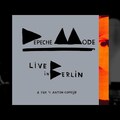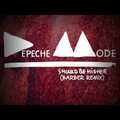But the partnership of singer David Gahan and songwriter Martin Gore can't escape the machine they've become, or the holding pattern they've gotten stuck in. (And then there's third member Andy Fletcher, who...Anyway!) The last album they made with more than two songs that have persisted in their live repertoire was Songs of Faith and Devotion in 1993. Since then, they've been on a steady regimen of releasing a studio record every fourth year, followed by a tour where they play a whole lot of songs from the era when Designing Women was on the air.
Delta Machine, like Playing the Angel and Sounds of the Universe before it, was produced by Ben Hillier, includes three songs with lyrics by Gahan, and sounds like it could be a set of outtakes from Songs of Faith and Devotion. The word "soul" appears in five of Gore's songs here, not including "Angel" or "Heaven" (which shouldn't be confused with the earlier "Halo" or "Judas" or "Sacred" or "Jezebel" or "Martyr"). It's old news that Gore's favorite lyrical topic is sin and salvation, and that's historically been a pretty fertile topic for songwriting in general. Unfortunately, there's no line here as sly as "Strangelove"'s "I give in to sin/ Because you have to make this life livable," and no sense that Gore's idea of sin extends to anything other than mildly kinky sex.
Then there's the blues stuff, i.e. loops of bluesy guitar licks, as on "Goodbye" (which might just as well be called "Personal Jesus XIV: The Personalizing"). Another one turns up in "Slow", repeating endlessly as Gahan sings Gore's lyrics about taking it nice and easy in bed these days. The requisite Gore vocal here, "The Child Inside", might have the most embarrassing extended metaphor he's committed to date (tears turn into a river that overflows and drowns the loved one's inner child?). As for Gahan's own songs-- this time, their music is by Kurt Uenala-- they're generally a reasonably convincing imitation of middling Gore. His "Should Be Higher" is yet another on the pile of ex-junkie lyrics; his "Broken" is a pale Silly Putty copy of "Behind the Wheel".
It's not a totally dull record. Gahan and Gore are singing as well and hyperdramatically as they ever have. "My Little Universe" is a clever piece of minimalism, constructed around a bare handful of acid-synth riffs-- effectively a companion piece to their 30-year-old "Leave in Silence". "Soft Touch/Raw Nerve" is catchy enough that its rhyme of "helping hand" with "understand" is forgivable. "Angel" will sound pretty good on their next greatest-hits collection, as long as they don't sequence it too close to "I Feel You".
Still, what made Depeche Mode work, when they worked, wasn't just the contrast between Gore's dry detachment and Gahan's dorky innocence (up to, let's say, Music for the Masses) and the late-breaking badassery that replaced it (from Violator onward). It was their constant pushing forward of their sound-- expanding the vocabulary of what electronics could do in pop songs. Their records were packed with cross-talking hooks, ingeniously knotted melodies, noises that blurred the border between pitch and percussion. They made rules for themselves, which made it more fun when they broke them.
But they stopped pushing forward long ago, and now they don't even bother pretending technology has opened up any possibilities for recorded sound in the past 20 years. Now they're just extruding a new album once in a while, reconfiguring the grooves and keywords of the albums from the period when they were a force in pop, without the push toward new noises and uncertain feelings that made that music powerful. There is not a single moment of shock or freshness on Delta Machine, and it's enormously frustrating to hear what was once a band of futurists so deeply mired in resisting change.
10/5.0





